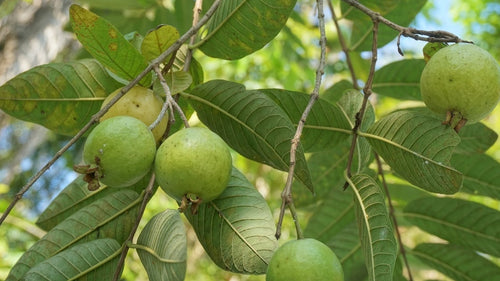AIT’s Green Start to 2025: Growing Bonds, Growing Trees
The Army Institute of Technology (AIT), one of India’s top-ranked engineering institutes operated by the Army Welfare Education Society, has embarked Read more
Plantation Site Gallery
Project Update 3
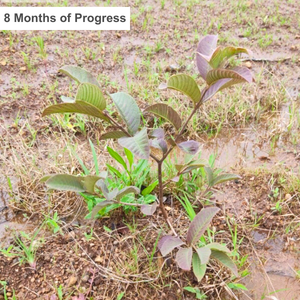
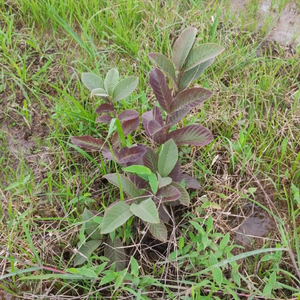
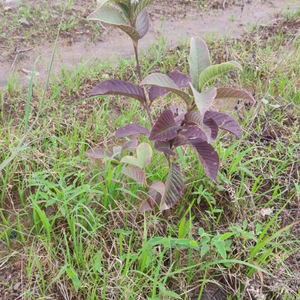
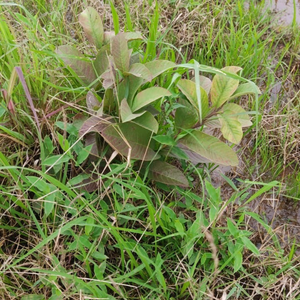
Project Update 2
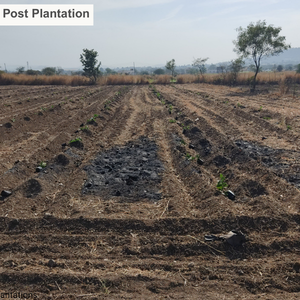
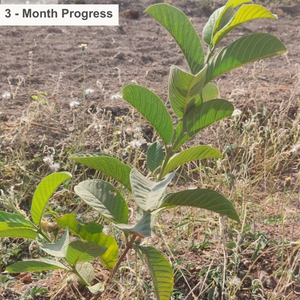
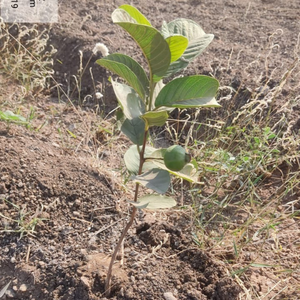
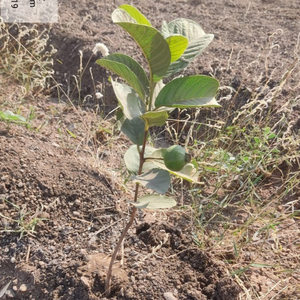
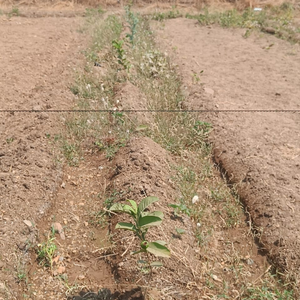
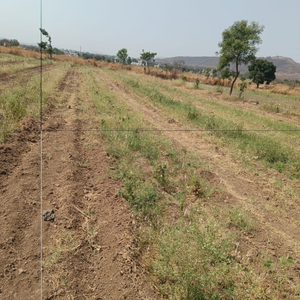
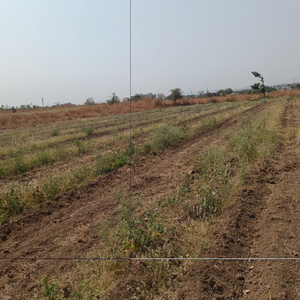
Project Update 1
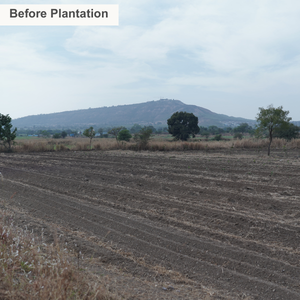
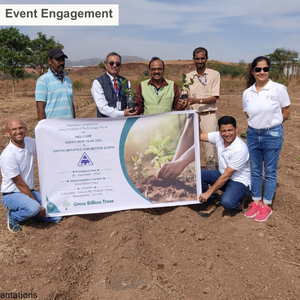
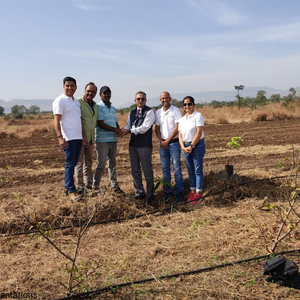
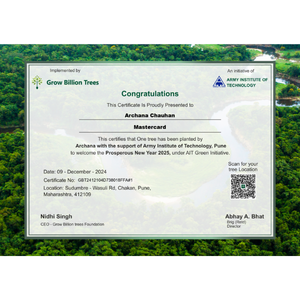

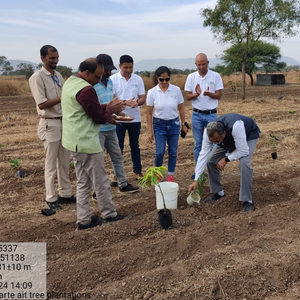
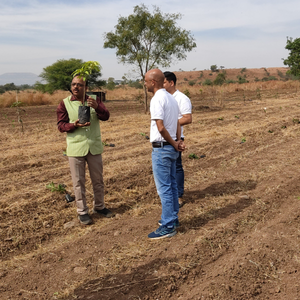
Digital Forest
Forest with 100 Trees planned
Want to plant your tree now?
Plant a Tree @ 299Trees Planted
AIT’s Green Start to 2025: Growing Bonds, Growing Trees
The Army Institute of Technology (AIT), one of India’s top-ranked engineering institutes operated by the Army Welfare Education Society, has embarked on a unique agroforest tree plantation initiative to usher in a greener New Year 2025. This initiative, in collaboration with Grow Billion Trees, aims to foster environmental stewardship while strengthening ties with corporate partners.
Under this initiative, trees are planted following the agroforest concept, where plantations are seamlessly integrated with agricultural landscapes. This farmer-centric approach prioritizes enhanced income diversification, offering farmers additional revenue streams from timber, fruits, and non-timber forest products. It also promotes improved livelihood resilience by creating a buffer against climate uncertainties, ensuring a stable source of income throughout the year. Furthermore, the initiative helps reduce farming costs by naturally enriching the soil, reducing the need for chemical fertilizers, and enhancing water retention. The agroforest model supports biodiversity, improves carbon sequestration, and strengthens the overall ecosystem. Each tree planted symbolizes the participation and commitment of corporate partners, fostering a shared vision for a greener, more sustainable future while uplifting local farming communities.
A notable highlight of this initiative is the leadership of Satender Kumar and Nandu Singh, a distinguished alumnus of AIT, reflecting the institute's enduring legacy of creating responsible leaders. With a remarkable record of 90% placements, industry-academia collaborations, and recognition as one of Pune’s top three institutions for campus placements, AIT continues to lead by example in both education and sustainability.
This green initiative marks a milestone for AIT, aligning with its 30-year tradition of excellence and commitment to community welfare. It serves as a testament to the power of alumni-driven change and the role of educational institutions in shaping a sustainable future.
Project Planning & Execution
No of Trees: 100
Plantation Location: Sudumbre - Wasuli Rd, Chakan, Pune, Maharashtra, 412109
Plantation Date: 9th December 2024
Name of Species: Guava
Species Selection & Its Benefits:
The initiative prioritises the planting of native tree species, ensuring high survival rates and fostering long-term ecological stability. By aligning tree selection with local market demand, the project enhances environmental sustainability and provides farmers with viable income opportunities. Farmer consent and participation play a crucial role in species selection, ensuring that the chosen trees integrate seamlessly with existing agricultural practices.
The project strategically selected Guava (Psidium guajava) for plantation due to its multiple economic, ecological, and social benefits. This species is hardy and low-maintenance, providing a reliable income through its fruit while enriching soil fertility, reducing erosion, and creating a favourable microclimate for crops. This thoughtful selection supports both environmental sustainability and the economic stability of local communities. Additionally, the trees contribute to carbon sequestration, enhancing climate resilience while strengthening the region’s green cover. Their ability to thrive with minimal water input makes them well-suited for sustainable farming in the area.
Beneficiaries Details
|
SN |
Farmer Name |
Google Location |
Village Name |
Plot Size |
Guava Planted |
|
1 |
Santosh Tarte |
Sudumbre, Taluka Maval |
0.14 acre |
100 |
This initiative has empowered Mr. Santosh Tarte, a local farmer from Maval village, Sudumbre region, to adopt agroforestry practices that enhance both environmental and economic outcomes. By integrating trees with agriculture, he benefits from improved soil fertility, enhanced water retention, and reduced erosion, while also gaining a diversified source of income through fruit-bearing trees. The plantation of Guava trees has opened up an additional livelihood opportunity, contributing to his long-term financial stability. This effort not only supports environmental sustainability but also strengthens economic resilience, promoting a sustainable farming model and contributing to the overall well-being of the Sudumbre region.
Planting Methodology and Its Advantages
AIT’s agroforestry initiative follows a strategic planting methodology that integrates trees, crops, and livestock on the same land, providing farmers with additional income and improving livelihoods. By combining agriculture and forestry, it enhances soil fertility, conserves water, and increases biodiversity while offering multiple revenue streams through fruit plants. This method reduces climate risks, improves farm productivity, and ensures long-term economic stability for farmers, making it a viable solution for sustainable rural development.
AIT welcomes 2025 with a unique green initiative, strengthening corporate bonds in collaboration with Grow Billion Trees. AIT embraces agroforestry as a key strategy for carbon sequestration, ecosystem restoration, and sustainable land management. This initiative underscores the company’s commitment to environmental stewardship, demonstrating a proactive approach to sustainability that contributes to a greener, more resilient future for generations to come. By adopting this integrated approach, AIT not only enhances environmental sustainability but also strengthens local communities by promoting long-term economic stability for farmers, ensuring a balanced coexistence of agriculture and forestry.
Advantages of Agroforestry
-
Increased Farmer Incomes: This approach helps increase farmers' income by as much as 3 times. Farmers benefit from diversified income sources, lifting economic resilience.
-
Sustainable Livelihoods: Farmers benefit from diversified income sources through the sale of fruits and other tree-based products, reducing dependence on a single crop.
-
Enhanced Biodiversity: Agroforestry creates a diverse ecosystem by integrating trees with crops, attracting pollinators, birds, and beneficial insects that support natural pest control.
-
Environmental Sustainability: This model reduces carbon emissions and promotes sustainable land management, aligning with SDG 13 (Climate Action) and SDG 15 (Life on Land).
-
Food Security & Nutritional Benefits: Fruit-bearing trees provide a direct source of food, improving local nutrition while supporting long-term agricultural productivity.
-
Carbon Sequestration & Climate Resilience: Trees absorb carbon dioxide, helping mitigate climate change while providing shade and windbreaks that reduce temperature extremes and improve microclimatic conditions.
-
Soil Health and Water Conservation: Tree roots prevent soil erosion, enhance water retention, and improve soil fertility by fixing nitrogen and adding organic matter. Agroforestry systems also support groundwater recharge, reduce runoff, and improve soil moisture retention, making them ideal for drought-prone regions.
Activities During Tree Plantation
The plantation activities at Sudumbre, Wasuli Rd, Maharashtra, were thoughtfully planned and executed, taking into account optimal soil conditions, local climate suitability, and the selection of saplings that offer both ecological value and livelihood opportunities. The site was carefully prepared with designated planting zones, ensuring long-term sustainability and success of the project.
AIT has established a distinctive program aimed at strengthening its ties with over 80 corporate partners, focusing on long-term collaboration and mutual growth. Staying true to its core values, AIT continually seeks to incorporate ecological consciousness into its academic framework, treating ecology not just as a subject but as a vital asset, true wealth for the future. As a token of appreciation and connection, the institute chose to present a gift that symbolizes life and sustainability—something that grows over time, much like the relationships it represents.
Every tree planted through this initiative stands as a testament to the shared commitment of AIT’s corporate partners towards building a sustainable future. The success of this plantation drive has been made possible by the visionary leadership of Brigadier Abhay Bhat, Director of AIT, and Professor Manoj Khaladkar, Training and Placement Officer (TPO), AIT, whose guidance and support have been instrumental in shaping this green mission. We are especially proud that this inspiring environmental movement is being led by AIT’s distinguished alumnus, Mr. Satender Kumar, Co-Founder & CIO of Grow Billion Trees, and Mr.Nandu Singh, Co-Founder & CTO, in collaboration with Ms. Nidhi Singh, Co-Founder & CEO.
Post-plantation care, including regular watering and sapling protection, was immediately initiated to ensure a high survival rate and healthy growth of the 100 Guava saplings planted. This effort is expected to improve soil fertility, enhance groundwater recharge, and offer additional income to farmers through fruit production, thereby fostering a resilient and self-sustaining farming model.
Brigadier Abhay Bhat, Director of AIT, expressed profound pride in the initiative, emphasizing that it reflects the values and aspirations that the institution instills in its students. By addressing the needs of various segments of society, AIT alumni are not just contributing to their industries but are also playing a vital role in shaping a better, more balanced world. For Brigadier Bhat, this commitment to creating meaningful impact is a testament to the strength of the institute’s values and the character of its graduates. He emphasized that their work embodies the core values of AIT, reaching beyond professional success to make a meaningful difference across all layers of society.
Through this initiative, AIT demonstrates not only a commitment to green practices but also to empowering local communities and driving positive change. By investing in nature-based solutions and forming strategic partnerships, the company continues to lead impactful sustainability efforts, building a greener, more inclusive future for all.
Conclusion Elements
Impact
Direct Impact
|
Parameters |
Values |
References |
|
No. of Trees Planted |
100 |
|
|
Green Cover (Acres) |
0. 14 |
|
|
Fruit Production Potential (Tons/Year) |
3 Tons |
|
|
Income Generation Potential (Rs/Year) |
60,000 |
|
|
Carbon Sequestration Potential (KG) |
20 |
Small to medium-sized trees can sequester around 10–48 kilograms (22–106 pounds) of CO₂ annually. https://onetreeplanted.org/blogs/stories/how-much-co2-does-tree-absorb |
|
Carbon Sequestration by 100 mature trees ( Tons/year) |
2 Tons |
No. of Trees x Carbon Sequestration by 1 mature tree per year |
|
Carbon Credit Equivalent |
2 |
One carbon credit is equivalent to one tonne of carbon dioxide or the equivalent amount of another greenhouse gas. |
|
Carbon Footprint of an avg Indian Citizen (Tons/Year) |
1.8 |
|
|
Offsets Annual Carbon Footprint of (Adults) |
1 |
Carbon offset by 100 mature trees per year / Carbon Footprint of an avg Indian Citizen per year |
* This impact analysis is forward-looking (An Agro-forestry project matures in 3-5 years)
Indirect Impact
Community Impact
-
Empowerment of Farmers: By providing training and resources for sustainable farming practices, agroforestry equips farmers with skills to enhance productivity and adapt to environmental changes.
-
Food Security: The integration of fruit-bearing trees and crops ensures a consistent food supply, improving nutrition and reducing hunger within the community.
-
Environmental Awareness: Community involvement in tree plantation fosters a sense of responsibility for environmental conservation and promotes sustainable practices in daily life.
-
Enhanced Social Equity: Agroforestry initiatives foster enhanced social equity by empowering marginalized farmers with sustainable livelihoods, bridging economic gaps, and promoting inclusive community participation in environmental conservation efforts.
-
Resilience to Climate Change: The diverse and sustainable nature of agroforestry helps communities mitigate the impacts of climate change, including extreme weather events, by stabilizing local ecosystems.
-
Health and Well-being: Green spaces created through agroforestry improve air quality and offer a healthier environment, contributing to the physical and mental well-being of the community.
Environmental Impact
-
Carbon Sequestration: Trees act as carbon sinks, absorbing significant amounts of CO2 from the atmosphere, helping to mitigate climate change and reduce greenhouse gas emissions.
-
Soil Health Improvement: Agroforestry enriches soil through organic matter from fallen leaves and roots, improving fertility, structure, and nutrient availability for crops.
-
Erosion Prevention: Tree roots stabilize the soil, reducing erosion caused by wind and water while protecting nearby agricultural fields and water bodies.
-
Biodiversity Conservation: By creating habitats for various species, agroforestry enhances biodiversity, supporting pollinators, beneficial insects, and native wildlife.
-
Water Cycle Regulation: Trees improve water retention, recharge groundwater levels, and reduce surface runoff, contributing to a more balanced and sustainable water cycle.
-
Microclimate Regulation: Agroforestry moderates temperature extremes, reduces wind speeds, and increases humidity, creating favorable conditions for crop growth and ecosystem balance.
Achievements
SDG Goals Achieved through Agroforestry
-
SDG 1: No Poverty – By integrating agroforestry with traditional farming practices, AIT’S’s initiative supports farmers like Santosh Tarte with additional income through fruit yields, improving economic resilience, and helping reduce poverty in rural areas.
-
SDG 2: Zero Hunger – The plantation of fruit-bearing Guava trees enhances food security by offering nutritional produce, while also enriching soil health and promoting sustainable agricultural productivity.
-
SDG 3: Good Health and Well-Being – Tree plantations contribute to cleaner air, improved soil fertility, and better water conservation, thereby creating a healthier environment for local communities. The greenery also supports mental well-being and a better quality of life.
-
SDG 4: Quality Education – The initiative includes farmer engagement and training in sustainable land-use practices. These educational efforts empower farmers with knowledge of agroforestry, climate resilience, and eco-conscious resource management.
-
SDG 6: Clean Water and Sanitation – Through improved soil structure and vegetation cover, the plantation helps reduce erosion, enhances groundwater recharge, and supports sustainable water management.
-
SDG 8: Decent Work and Economic Growth – The project generates rural employment, promotes sustainable agroforestry practices, and supports long-term economic growth by increasing the productivity of agricultural lands.
-
SDG 9: Industry, Innovation, and Infrastructure – AIT incorporates innovative agroforestry models, focusing on ecological design, soil regeneration, and land-use optimisation, fostering sustainable development and rural transformation.
-
SDG 10: Reduced Inequalities – By engaging small landholder farmers and ensuring community participation, the project promotes inclusive growth and equitable access to the environmental and economic benefits of agroforestry.
-
SDG 12: Responsible Consumption and Production – The project encourages reduced reliance on chemical inputs, promotes organic farming practices, and supports the sustainable use of natural resources, enhancing long-term agricultural viability.
-
SDG 13: Climate Action – The planted Guava trees act as carbon sinks, sequestering CO₂ from the atmosphere, improving microclimates, and building resilience against the adverse effects of climate change.
-
SDG 15: Life on Land – The initiative contributes to biodiversity conservation, improves habitat quality, and supports ecological restoration, aligning with global efforts to protect, restore, and promote sustainable land ecosystems.
-
SDG 17: Partnerships for the Goals – The collaboration between AIT, Grow Billion Trees, and local farmers showcases the impact of cross-sector partnerships in advancing shared environmental and social goals through community-based green initiatives.
ESG Achieved through Agroforestry:
-
Environmental Impact: AIT’s agroforestry initiative significantly contributes to environmental sustainability by promoting carbon sequestration, enhancing biodiversity, and improving soil and water conservation. The plantation of Guava trees, a fruit-bearing species well-suited to the region, aids in climate change mitigation by capturing atmospheric carbon dioxide and strengthening ecosystem resilience. This green effort helps prevent soil erosion, supports groundwater recharge, and contributes to a healthier, greener landscape. By integrating sustainable agroforestry practices with traditional farming, the initiative fosters a self-sustaining ecosystem that benefits both the environment and the livelihoods of local farmers, ensuring long-term ecological and social impact.
-
Social Impact: AIT’s agroforestry initiative delivers significant social benefits by promoting sustainable livelihoods, food security, and community well-being. The integration of Guava trees provides farmers, including Santosh Tarte, with diversified income sources, ensuring greater economic stability and resilience for rural households. By optimising land use efficiency, the initiative enhances agricultural productivity while maintaining ecological balance. Additionally, the plantation improves air quality, creates green spaces that contribute to community well-being, and fosters local engagement through awareness programmes. By educating and empowering farmers with sustainable land management practices, the initiative strengthens long-term environmental and social sustainability, benefiting both the region and its people.
-
Governance Impact: AIT upholds strong governance principles by adhering to ethical and responsible corporate practices in sustainability. This agroforestry initiative is an integral part of the company’s Corporate Social Responsibility (CSR) strategy, ensuring transparency, accountability, and long-term impact. By collaborating with Grow Billion Trees, local farmers, and communities, AIT fosters strategic partnerships that promote environmental stewardship and responsible land management. The initiative underscores the company’s commitment to ESG (Environmental, Social, and Governance) principles, reinforcing its role as a leader in sustainability and social responsibility.
Building Communities
AIT’s agroforestry initiative goes beyond tree plantation—it strengthens rural communities by empowering farmers, fostering collaborations, and creating sustainable livelihoods. By integrating environmental stewardship with social impact, the project nurtures a sense of shared responsibility, driving long-term benefits for both people and the planet.
-
Empowering Farmers: AIT’s agroforestry initiative strengthens farmers’ economic stability by diversifying income sources and improving agricultural productivity. By integrating tree plantations with existing farmland, farmers benefit from enhanced soil fertility, better crop yields, and long-term financial gains. This initiative promotes self-sufficiency and long-term environmental stewardship, ensuring a sustainable future for both farmers and the ecosystem.
-
Fostering Partnerships: Collaboration is at the core of AIT’s plantation initiative, bringing together corporate, environmental, and community stakeholders. The partnership between AIT, Grow Billion Trees, and the local farmer created a strong foundation for sustainable development. By leveraging collective expertise and resources, this initiative ensures that environmental and social benefits extend beyond the immediate plantation, fostering long-term ecological and economic resilience.
-
Creating a Ripple Effect: The impact of this initiative goes beyond tree planting; it sets in motion a chain reaction of positive environmental and social change. By improving biodiversity, enhancing carbon sequestration, and promoting sustainable farming, the project contributes to a healthier ecosystem. Additionally, as more farmers adopt agroforestry practices, the region experiences long-term economic and environmental benefits, inspiring further community-driven conservation efforts.
This initiative proved that environmental sustainability thrives when rooted in community effort. It’s not just about planting trees—it’s about planting hope, collaboration, and a shared vision for a greener tomorrow.
Commitment by Grow Billion Trees
-
Ensuring Tree Survivability: GBT prioritizes native species, continuous monitoring, and soil health improvement using organic fertilizers. These efforts ensure sustainable growth and benefit the farmers and communities.
-
Transparency & Accountability: GBT provides detailed reports on tree growth, survival rates, and carbon benefits, using geo-fencing and regular updates to maintain transparency and effectiveness.
-
Sustainable Plantation Efforts: GBT implements projects that balance environmental, social, and economic goals, addressing urban heat islands and degraded farmlands. These efforts promote ecological balance, livelihoods, and long-term climate resilience.
-
Enhancing Ecosystem Health: By selecting native species and creating diverse habitats, GBT enhances biodiversity and ecosystem resilience, ensuring long-term ecological health and supporting wildlife.
-
Long-Term Impact: GBT’s initiatives tackle environmental challenges, enhance rural livelihoods, foster climate resilience, and promote sustainable development while reducing carbon footprints.
Acknowledgment
We extend our heartfelt gratitude for the successful completion of the plantation initiative at Sudumbre, Wasuli Rd, Maharashtra. This initiative marks a significant step towards environmental restoration, sustainable land use, and community empowerment. Its success would not have been possible without the collective efforts of dedicated individuals, local farmers, and partner organisations. Their unwavering commitment has played a crucial role in fostering a greener, more resilient ecosystem for future generations.
To AIT: We sincerely thank AIT for its unwavering dedication to sustainability and environmental conservation. By integrating agroforestry into its Corporate Social Responsibility (CSR) initiatives, AIT has demonstrated a strong commitment to fostering greener landscapes and empowering local communities. This effort will enhance biodiversity, improve soil health, and contribute to carbon sequestration, ensuring long-term ecological and economic benefits.
Moreover, by promoting sustainable land use, this initiative plays a vital role in supporting farmers, enhancing their livelihoods, and providing additional income opportunities through fruit production.AIT’s dedication to environmental sustainability and community upliftment is truly commendable, and we are grateful for its contribution to a greener, more resilient future.
To Mr. Santosh Tarte: Your dedication to embracing agroforestry and incorporating fruit-bearing trees into your farming practices is truly commendable. This initiative not only enriches soil health but also strengthens long-term agricultural sustainability. Your commitment to fostering a healthier ecosystem while securing a better future for future generations is inspiring. We are grateful to be part of this journey and look forward to witnessing the lasting positive impact of your efforts.
To Our Ground Partners and Volunteers: Your dedication, expertise, and passion for environmental conservation have been essential in making this initiative a success. Through our collective efforts, we have shown that collaboration and a shared vision for sustainability can create a lasting impact. Your invaluable contributions have played a crucial role in driving this mission forward, and we deeply appreciate your commitment. Thank you for being an integral part of this journey toward a greener future.
Through this collective effort, we have taken significant steps toward revitalizing ecosystems, promoting sustainable agriculture, and enhancing the livelihoods of farmers in Sudumbre. This is just the beginning, and we look forward to strengthening our partnership in pursuit of a greener, more sustainable future for all.
Thank you for your unwavering commitment and support.
Closing Remarks
The successful completion of the agroforestry plantation at Sudumbre, Wasuli Rd, Maharashtra 412109, marks a significant milestone in AIT’s journey towards environmental sustainability and community empowerment. This initiative has not only expanded the region’s green cover but has also provided long-term benefits to local farmers by integrating sustainable agricultural practices.
By enhancing soil fertility, supporting water conservation, and generating additional income through fruit production, the project strengthens livelihoods and promotes financial stability for farming communities. With 100 Guava trees now flourishing, this initiative will continue to contribute to ecological balance, biodiversity restoration, and climate resilience.
As we celebrate this achievement, we reaffirm our commitment to driving impactful sustainability efforts and inspiring more organisations and individuals to take action for the environment. We extend our deepest gratitude to the Army Institute of Technology, the farmer of Sudumbre, our partners, and all those who contributed to making this project a success. Your dedication and collaboration have been instrumental in turning this vision into reality.
This is just the beginning of a larger movement towards a greener and more sustainable future. Through collective efforts, we can build a resilient environment and leave a lasting legacy for generations to come.
Trees for Corporates
Trending
Most Popular
1. AIT Tree Plantation Initiative
A Green New Year Celebration AIT’s tree plantation initiative under the agroforest concept is a perfect way to welcome the New Year with a green touch. Through its collaboration with Grow Billion Trees, the institute has embarked on a mission to plant trees that symbolize a commitment to sustainable development. This initiative not only focuses on the environment but also builds stronger bonds among corporate partners, alumni, and students. As trees are planted, they help reduce carbon footprints, enhance biodiversity, and provide long-term ecological benefits. It’s not just about growing trees; it’s about growing future generations of environmentally conscious individuals. The event’s fun, engaging nature makes it more than just an environmental task—it’s an opportunity to reflect on how small actions can lead to big changes for the planet. Cheers to AIT and its green initiative, setting the pace for a sustainable and successful 2025!
2. Agroforest Concept at AIT
Blending Nature with Innovation The agroforest concept is a harmonious blend of agriculture and forestry, and AIT is embracing it in full force! This innovative approach doesn’t just plant trees for environmental impact; it creates sustainable ecosystems where crops and trees grow together. By integrating trees with agriculture, AIT fosters healthier soils, reduces the need for chemical fertilizers, and promotes biodiversity. The goal is to enhance food security, improve water quality, and protect the land while helping future generations develop a deep appreciation for eco-friendly farming practices. What’s even better? It’s a concept that benefits both nature and the community, making sustainability not only an environmental goal but also a rewarding, profitable venture for farmers.
3. Corporate Social Responsibility through Tree Plantation
AIT’s Green Commitment Corporate Social Responsibility (CSR) at AIT isn’t just about writing checks; it’s about active participation in making the world a greener place. Through its tree plantation initiatives, AIT engages corporate partners who take pride in contributing to sustainability goals. Companies not only support AIT’s agroforest initiative but also participate hands-on, planting trees that will grow for decades. This collaboration aligns businesses with eco-conscious values, helping them contribute meaningfully to the environment. The best part? It’s a win-win situation where companies boost their sustainability credentials while actively making a positive environmental impact. AIT’s CSR-driven approach reflects the power of partnerships in achieving sustainable development.
4. Sustainable Development Goals (SDGs) and AIT’s Tree Plantation AIT’s tree plantation initiative is making significant strides in meeting several Sustainable Development Goals (SDGs), most notably SDG 13 (Climate Action) and SDG 15 (Life on Land). By planting trees, AIT directly combats climate change through carbon sequestration and supports biodiversity by creating a habitat for a variety of species. The tree-planting event encourages the wider community to engage with environmental challenges, providing a practical example of how local actions can contribute to global sustainability efforts. Through its agroforest model, AIT helps build a sustainable future, promoting long-term environmental solutions that can help meet the targets of the United Nations SDGs.
4. Sustainable Development Goals (SDGs) and AIT’s Tree Plantation AIT’s tree plantation initiative is making significant strides in meeting several Sustainable Development Goals (SDGs), most notably SDG 13 (Climate Action) and SDG 15 (Life on Land). By planting trees, AIT directly combats climate change through carbon sequestration and supports biodiversity by creating a habitat for a variety of species. The tree-planting event encourages the wider community to engage with environmental challenges, providing a practical example of how local actions can contribute to global sustainability efforts. Through its agroforest model, AIT helps build a sustainable future, promoting long-term environmental solutions that can help meet the targets of the United Nations SDGs.
5. Tree Plantation in Agroforestry
A Win for the Environment Agroforestry is the real MVP of AIT’s green initiatives. This model combines trees and agriculture in a way that enhances the environment while providing economic benefits. By planting trees alongside crops, AIT creates a multi-layered system that nurtures soil health, conserves water, and reduces erosion. The combination of trees and crops promotes sustainable land management, which increases productivity without depleting natural resources. Additionally, the agroforestry system helps combat climate change by sequestering carbon in trees and improving the land’s resilience to changing weather patterns. With AIT championing this model, the future of farming looks greener and more sustainable than ever.
6. Corporate Engagement in Environmental Sustainability
AIT’s Green Drive Corporate engagement is at the heart of AIT’s tree plantation initiative. The institute understands that achieving large-scale environmental impact requires collaborative efforts, and that’s why it partners with businesses to promote corporate engagement in environmental sustainability. By bringing companies into the fold, AIT encourages businesses to take part in hands-on tree planting activities, thus fostering a deeper connection to sustainability. This collaboration not only benefits the environment but also helps companies fulfill their CSR objectives, demonstrating that working together can make a tangible difference. The corporate involvement adds a level of excitement, as industry leaders and employees alike come together for a cause that’s as impactful as it is rewarding.
7. Tree Planting Events for Social Change
AIT’s Eco-Community Building AIT’s tree planting events aren’t just about planting trees—they’re about planting the seeds of social change. These events provide opportunities for students, alumni, and local communities to come together, engage in environmental action, and create a collective sense of responsibility toward a greener future. By participating in these events, individuals are not only helping the environment but also building a community of like-minded individuals who are passionate about sustainability. The atmosphere at AIT’s tree planting activities fosters teamwork and social bonding, making these green events a positive force for both personal and environmental growth.
8. Biodiversity Preservation through Agroforestry at AIT One of the standout benefits of AIT’s agroforestry initiative is its emphasis on biodiversity preservation. Agroforestry offers a unique way to integrate native plant species and protect wildlife habitats. At AIT, trees planted as part of the agroforest concept provide shelter and food for a variety of species, supporting a more diverse ecosystem. This effort helps restore ecosystems that may have been degraded by monoculture farming or deforestation. By fostering a rich, biodiverse environment, AIT ensures that its tree plantation initiative benefits not just humans but all living creatures, creating a thriving, interconnected habitat for future generations.
8. Biodiversity Preservation through Agroforestry at AIT One of the standout benefits of AIT’s agroforestry initiative is its emphasis on biodiversity preservation. Agroforestry offers a unique way to integrate native plant species and protect wildlife habitats. At AIT, trees planted as part of the agroforest concept provide shelter and food for a variety of species, supporting a more diverse ecosystem. This effort helps restore ecosystems that may have been degraded by monoculture farming or deforestation. By fostering a rich, biodiverse environment, AIT ensures that its tree plantation initiative benefits not just humans but all living creatures, creating a thriving, interconnected habitat for future generations.
FAQ
What is AIT’s tree plantation initiative?
AIT’s tree plantation initiative is a key part of our commitment to environmental sustainability. In partnership with Grow Billion Trees, we focus on the agroforest concept, integrating trees with agricultural systems to improve biodiversity, soil health, and carbon sequestration. This initiative aims to foster corporate participation and strengthen industry-institution relationships while contributing to sustainable development goals. Through tree planting, we encourage both our alumni and corporate partners to actively participate in environmental conservation.
How does AIT’s agroforest initiative work?
AIT’s agroforest initiative integrates trees with crops in a sustainable agricultural model. Trees are planted alongside agricultural crops, benefiting the land by preventing soil erosion, improving water retention, and boosting biodiversity. This practice not only enhances environmental health but also offers economic advantages, including improved crop yields and resilience against climate change. AIT’s approach supports both sustainable farming and environmental stewardship, making it a win-win for the community and nature.
What are the benefits of agroforestry?
Agroforestry at AIT offers multiple benefits: it promotes biodiversity by creating a variety of habitats, improves soil health, enhances water retention, and increases carbon sequestration. By planting trees alongside crops, we create a more resilient farming ecosystem, reducing dependence on chemical fertilizers and promoting sustainable agricultural practices. Additionally, agroforestry can help boost crop productivity while ensuring long-term environmental sustainability.
How does AIT engage corporate partners in tree planting?
AIT’s tree plantation initiative is designed to encourage corporate involvement through active participation in tree planting events. By collaborating with businesses, we create a sense of responsibility and shared purpose in environmental conservation. Corporate partners are invited to join us in the plantation process, helping plant trees while fostering stronger relationships with the institution. This partnership not only contributes to environmental sustainability but also aligns businesses with their corporate social responsibility (CSR) goals.
Why is tree planting important at AIT?
Tree planting is a vital initiative at AIT as it contributes to sustainable development and helps in mitigating climate change. Trees play an essential role in reducing carbon footprints, enhancing biodiversity, and improving air quality. AIT’s tree plantation activities are aligned with the institute’s commitment to environmental sustainability and are aimed at building a greener and more sustainable future. These efforts support global goals and engage the community in meaningful environmental action.
What role do alumni play in AIT’s tree plantation initiative?
AIT alumni play a crucial role in supporting and leading the institute’s tree plantation initiative. Through their participation, they help bridge the gap between the institution and industry partners. Many alumni, including distinguished leaders like Satender Kumar, actively engage in the tree planting activities, driving the initiative forward. Their involvement not only strengthens AIT’s corporate ties but also emphasizes the significance of environmental responsibility within the alumni network.
How does AIT’s tree plantation support the SDGs?
AIT’s tree plantation initiative helps achieve several Sustainable Development Goals (SDGs), such as SDG 13 (Climate Action), SDG 15 (Life on Land), and SDG 17 (Partnerships for the Goals). By planting trees, AIT contributes to carbon sequestration, enhances biodiversity, and promotes sustainable agricultural practices. The partnership with Grow Billion Trees also exemplifies how collaboration with corporates and communities can advance global sustainability goals, fostering a more resilient environment for future generations.
Can students get involved in AIT’s tree plantation activities?
Yes, AIT students are encouraged to participate in tree plantation events as part of the institution’s environmental engagement efforts. Students can contribute to the plantation and maintenance of trees while learning about agroforestry and sustainability practices. This hands-on experience not only helps students develop environmental awareness but also nurtures their sense of responsibility towards global environmental challenges.
What makes agroforestry a sustainable solution for India?
Agroforestry is a sustainable solution for India because it integrates trees with crops in a way that enhances both environmental and agricultural productivity. By practicing agroforestry, farmers can reduce soil erosion, improve water retention, and boost crop yields. In a country where agriculture plays a major role in the economy, agroforestry offers a way to maintain ecological balance while ensuring long-term food security and economic sustainability for farmers.
How can companies partner with AIT for tree plantation?
Companies can partner with AIT for tree plantation by engaging in corporate social responsibility (CSR) activities, sponsoring events, or directly participating in tree planting campaigns. AIT welcomes collaboration from businesses committed to environmental sustainability, offering them an opportunity to be part of a larger eco-friendly initiative. Through such partnerships, companies can strengthen their environmental footprint and contribute to sustainable development goals while enhancing their community relations.
- Choosing a selection results in a full page refresh.
- Opens in a new window.


